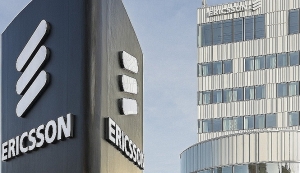Automating ports with 5G
Container shipping is having to grow to keep up with demands in consumer and industrial trade. This growth places greater pressure on ports to be more efficient and sustainable, as well as offer more competitive pricing to keep attracting major shipping lines.
 |
| Rita Mokbel, president, Ericsson Vietnam |
The world’s ports only have a limited amount of yard space. So as both the volume of shipping trade and the size of vessels increase, ports are being forced to look at how best to utilise their assets. According to studies, port operators see optimising yard and terminal operations as their number one priority and challenge. This makes it imperative to reduce equipment failures and downtime of critical equipment like cranes. Further, yard congestion creates not only inefficiencies, but also more environmental impact.
The many benefits of automation are becoming increasingly clear to port operators. They are realising that they can improve all aspect of operations, greater efficiency, lower costs, better monitoring, and increased safety. All of these lead to higher productivity, safer operations, and those all-important stronger bottom lines. Digital transformation is essential to increasing operational efficiency as well as supporting decarbonisation efforts.
5G is well optimised for the Internet of Things (IoT), ensuring low energy usage, increased data security, and the ability to support high connection density. In contrast to legacy networks, 5G provides a complete connectivity solution for licensed and unlicensed spectra, as well as seamless cellular vehicle-to-everything communication. The complete solution allows port operators to only use one backhaul for all services instead of installing several pieces of network equipment on, for example, a crane.
Belfast Harbour in Northern Ireland had an ambition to become the world’s smartest and most efficient port. With a lot of activity and logistics challenges to solve, this put high requirements on mobility and connectivity.
Together with British Telecom and Ericsson, Belfast harbour deployed a private 5G network solution, with immediate results: 20 per cent cost-savings related to condition-based monitoring; 50 per cent reduction in time spent inspecting inaccessible assets; and 56 per cent reduction in installation and maintenance for CCTV cameras
This case shows the value 5G provides to industries. 5G technologies at the Port of Livorno led to an estimated 8.2 per cent reduction in CO2 as a result of improved yard movements. Leveraging 5G alongside technologies such as AI, IoT, and connected autonomous vehicles can enhance public safety, security, and sustainability throughout both the port and the surrounding city.
Meanwhile, Singtel and Ericsson have announced a partnership to deploy 5G advanced connectivity solutions at Tuas Port in Singapore. This is in support of PSA Singapore’s plans to build the world’s largest fully automated port by the 2040s to meet the rapidly rising demand for global transshipment. Existing automated vehicles deployed at the port, such as automated guided vehicles, will be upgraded to 5G to enhance real-time shipment tracking and further streamline crane operations to enable seamless transportation of cargo from berth to ships and vice versa.
To support these enhancements, Singtel will activate a network slice from its 5G network to provide the dedicated resources, like high speeds, high bandwidth, and low latency, needed for mission-critical applications to run smoothly around the clock. It will also create secure private networks tailored to the port’s specific security needs, to help mitigate the risk of data breaches and unauthorised access.
5G will be an enabler for PSA to achieve an annual handling capacity of 65 million TEUs, almost double current demand, when Tuas Port is fully completed.
5G’s high speeds and low latency help to improve real-time communication and data transfer, which enables highly efficient port operations. With network slicing, these capabilities are augmented with increased security features and higher performance assurance. Leveraging 5G’s rapid data transmission and connectivity capabilities, PSA aims to further streamline operations and optimise resource utilisation through real-time monitoring, enabling it to respond with agility to the evolving needs of its customers.
5G has been enabling the digital transformation of various industries, from manufacturing, power and utilities, mining, to airports and seaports. The seaport sector, with its complex operations and reliance on real-time data, is benefiting significantly from 5G capabilities. Ericsson has seen an uptick in the adoption of 5G private networks at ports, and this trend is well-founded. Because of the demands for bandwidth, device density and latency capabilities essential in port environments, private 5G cellular networks deliver robust capabilities, complete with advanced automation solutions.
Other ports engaging in transformative initiatives through Ericsson 5G private networks include Port Tyne, one of the UK’s major deep-sea ports. It is building innovative use cases leveraging 5G-enabled CCTV, IoT sensors, AI, drones, and other technologies to automate manual tasks and support its vision of a greener, safer and more efficient model.
Ericsson leads the industry in providing cutting-edge connectivity solutions tailored for ports and supply chain logistics. Our comprehensive private network portfolio ensures extensive coverage and customisable solutions, precisely designed to meet the diverse and specific needs of port operators.
As the maritime landscape evolves towards smart infrastructure, the integration of 5G private cellular networks is key in accelerating digitalisation to unlock safer and more efficient operations. Vietnam’s rapid expansion of port infrastructure is playing a key role in meeting the accelerated demand of international trade. By embracing advanced technologies based on 5G, Vietnamese ports too can enhance their operational efficiency and sustainability.
 | Driving digital transformation with 5G As a pioneer in 5G network infrastructure, Ericsson is supporting Vietnam in developing its digital economy. Rita Mokbel, head of Ericsson Vietnam, talked to VIR’s Bich Thuy about upcoming priorities to support building innovative 5G use cases. |
 | Ericsson and VNPT collaborate on 5G in Vietnam Ericsson and VNPT, one of Vietnam's leading telecommunications operators, officially announced on October 10 their partnership to deploy 5G technology. |
What the stars mean:
★ Poor ★ ★ Promising ★★★ Good ★★★★ Very good ★★★★★ Exceptional
Related Contents
Latest News
More News
- Masan Consumer names new deputy CEO to drive foods and beverages growth (February 23, 2026 | 20:52)
- Myriad risks ahead, but ones Vietnam can confront (February 20, 2026 | 15:02)
- Vietnam making the leap into AI and semiconductors (February 20, 2026 | 09:37)
- Funding must be activated for semiconductor success (February 20, 2026 | 09:20)
- Resilience as new benchmark for smarter infrastructure (February 19, 2026 | 20:35)
- A golden time to shine within ASEAN (February 19, 2026 | 20:22)
- Vietnam’s pivotal year for advancing sustainability (February 19, 2026 | 08:44)
- Strengthening the core role of industry and trade (February 19, 2026 | 08:35)
- Future orientations for healthcare improvements (February 19, 2026 | 08:29)
- Infrastructure orientations suitable for a new chapter (February 19, 2026 | 08:15)

 Tag:
Tag:



















 Mobile Version
Mobile Version